Six minutes remained on the clock and Ireland desperately needed a goal to continue their Euro 2016 campaign, writes Ed Leahy.
Moments later, a glorious chance arrived; Wes Hoolahan through on goal with only the Italy keeper Salvatore Siriguto beat.
Irish fans were packed into the stand behind the posts and the thousands of green-clad supporters beckoned Hoolahan to take a touch and smash the ball home.
He missed.
"Goodness gracious, was that not the chance?" lamented RTÉ commentator George Hamilton during the live television commentary.
"That was the chance, you couldn’t have got a better chance," confirmed an equally downbeat co-commentator Ronnie Whelan.
That was it. That was surely the chance. Ireland and their merry (very merry) band of loyal followers were going home.
The party-loving Irish would soon be back to the hum-drum life that awaited back home.
Back to work, and what remained of the always-grey Irish summer. Perhaps this month’s maxed-out credit card bill would already be waiting amidst all that junk mail that had been building for the two weeks that they were away following the Boys in Green from Paris to Bordeaux and on to Lille.
But wait.
This Irish team do not know when to give up and within 60 seconds, Hoolahan’s anguish was already forgotten as he found himself in space on the right wing.
The Norwich midfielder cut inside, spotted the run of a team-mate and sent the most delightful ball over the top of the retreating Italian defence.
Robbie Brady kept his run going into the space between defence and advancing keeper.
The midfielder, best known for his gifted left foot, was bold and brave and threw his head at the arriving ball to guide it past the keeper and into the back of the net.
The stadium erupted. The team and fans celebrated as one. The normally neutral press box exploded, even the English journalists, remarkably, who had been embedded with the Irish camp throughout, who knew that their journey would now continue on to Lyon.
Brady, of course, sent Ireland into the last 16 of the Euros and immediately wrote himself into Irish footballing folklore, to be forever mentioned in the same breath as Ray Houghton, Ronnie Whelan, Kevin Sheedy and Robbie Keane.
“That night in Lille will be the highlight of many people’s lives”, to paraphrase Christy Moore.
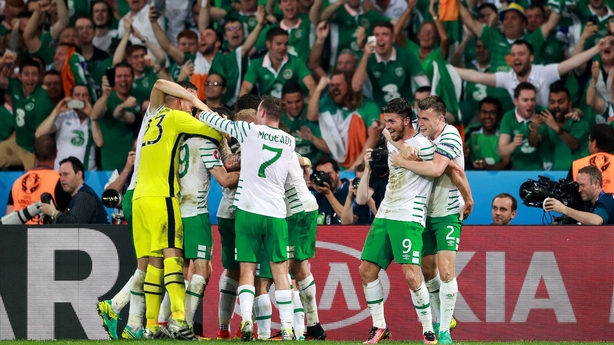
New Year, new blood needed to strengthen the squad
Back at the turn of the New Year, Ireland began 2016 still buoyed from the two-legged play-off victory against Bosnia-Herzegovina, but with the Euros approaching, it was evident that the manager was on the lookout for new blood to improve his squad for France.
The two March friendly matches were the only realistic chances for players to stake a claim in the squad, and while the manager entertained the idea of introducing new players into his 23, Shane Duffy was the only man to emerge from the pack of hopefuls.
Harry Arter, Eunan O’Kane, Jonny Hayes, Alan Judge, Paul McShane, Rob Elliott and Callum O’Dowda missed out, whether through injury or inexperience.

Arter was expected to make it to France but for a last-minute injury, which ruled him out, while O’Dowda made a real late claim for inclusion, following an excellent cameo at Turner’s Cross on the night that the squad was eventually named.
In the end, O’Neill stayed loyal to the group that qualified Ireland for the tournament and in hindsight, that probably proved the right call as the now-renowned team spirit was not risked by the inclusion of a possibly perceived outsider.
Aspirations low, expectations high
The only real aspiration from an Irish fan’s perspective going into the tournament was that the team performed better than Giovanni Trapattoni’s side, who fell flat on their faces in Poland at the 2012 tournament.
But perhaps that perception was allowing a touch of complacency to filter through into the squad, and the performance at Turner’s Cross, where Ireland were well beaten by Belarus, proved the catalyst to shock the side into action ahead of the tournament.
And no better man to tell it as he saw it than Roy Keane, who tore strips off his own players in the aftermath of that debacle, the performance, perhaps, embarrassing the assistant manager in front of his own people down by the Lee.
Lesser comments have ruined international camps at big tournaments, but thankfully for Ireland, the players appeared to answer the former captain’s call and increased the intensity while training in Versailles in the build-up to the opening game of the tournament.
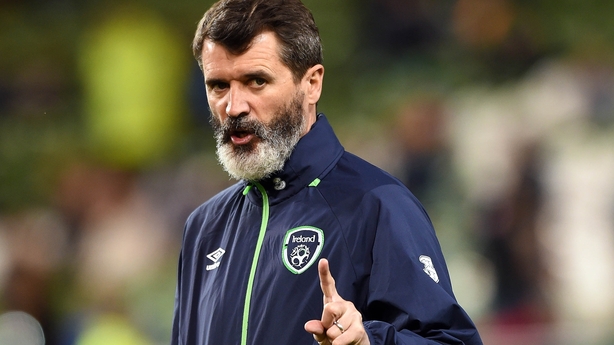
Big man, small man – Ireland and Sweden share spoils
The French capital and the venue of the Euro 2016 final proved the perfect setting as two of the best supported teams at the tournament went head to head in their opening encounter.
Despite the shenanigans that were happening down in Marseille, where Russian and English fans clashed, there was not even a hint of malice on the streets of Paris or surrounding the 80,000-capacity Stade de France as Irish and Swedish fans happily mingled throughout the build-up.
Pre-match banter was dominated by the threat of Swedish superstar Zlatan Ibrahimovic and how best to deal with the now Manchester United striker.
But Ireland laid down a real statement of intent during those opening 45 minutes at the Saint-Denis arena as young guns Jeff Hendrick and Robbie Brady showcased their talents, while John O’Shea and Ciarán Clark, with the help of holding midfielder Glenn Whelan, were keeping the tall Swede out of the picture.
Ireland’s most creative player rose to the occasion and when Wes Hoolahan guided the ball home early in the second half, O’Neill’s side took a well-deserved lead and looked like they would be opening their campaign with a win.
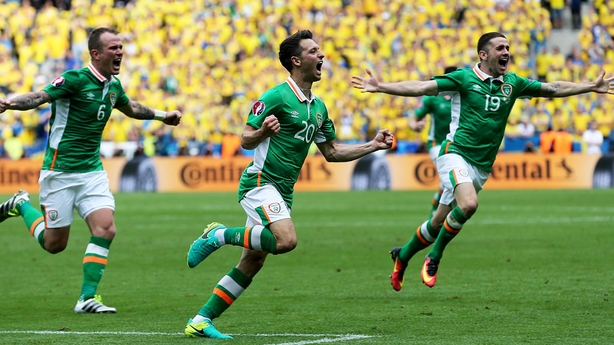
But instead of building on that lead, the Irish team went into defensive mode, allowing the largely ineffective Swedes into the game, with Ibrahimovic gradually influencing proceedings.
And it was no surprise that the big man was involved when Sweden did finally break through, thanks to an unfortunate Clark own goal.
The only surprising factor at that stage was that Ireland held on for a vital point.
It was certainly deserved considering they dominated so much of the play for the opening 50 minutes, and that point would indeed prove crucial when it came to qualifying for the knock-out stages.
Exposed by Belgium in Bordeaux
Despite that mini-collapse against Sweden, the manager gave that starting XI a vote of confidence, naming a virtually unchanged side for the clash with the much-fancied Belgians.
The only change being an enforced one, with Stephen Ward coming in for the injured Jonathan Walters.
Belgium had opened with a defeat to Italy and looked a different side as they went at Ireland from the opening exchanges, attacking on either flank and through the middle.
Ireland defended gamely throughout that punishing first 45 but it was only a matter of time before Belgium broke through, which remarkably actually arrived as a direct result of one of the few Irish forays into opposition territory.
Goals two and three gave the scoreline a fair reflection of the Belgian dominance and hammered home to the Irish management that a change of tactics and personnel were needed immediately.
The last-chance saloon was waiting in Lille.
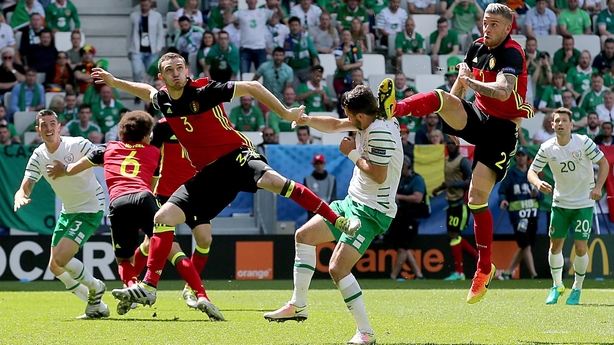
Italy
Energy - the buzz word from the Ireland management in the build-up to the final group game, which had now become a must-win encounter for the Boys in Green.
A tough task, no doubt, but certainly not an impossible one, considering Antonio Conte’s side had already progressed as group winners, knowing that they had to face the mighty Spanish in the round of 16.
Naturally, Italy named a second string side, yet still a team full of Champions League-level players, while Martin O’Neill remained true to his word as he named a young side, setting them out in a very attacking formation, relying on that aforementioned energy.
Irrespective of the opposition, Ireland played without fear under the closed roof of the Stade Pierre Mauroy in the northern French city and made sure that they would not be going home without a real fight.
The victory, of course, did arrive thanks to that Robbie Brady header in the dying minutes and the Ireland journey would continue.
Next stop Lyon to take on the host nation.
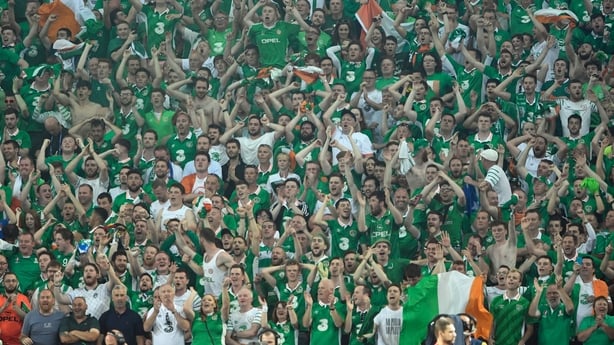
France
After the euphoria of Lille, Ireland barely had time to catch their breath before they were thrust into the cauldron of the knock-out stages.
France, on the other hand, had a full week between their final group game and the clash with Ireland, thanks to a favourable draw, designed to keep the hosts at their preferred venues throughout.
It’s fair to say that Ireland needed a minor miracle to get past the star-studded, well-rested French side, and while the gift of a penalty kick handed O'Neill's men the lead as Didier Deschamps’ side were caught cold, perhaps that divine intervention came much too early in the contest as Ireland had to defend with their lives for the remaining 88 minutes.
Ireland did get to half-time without conceding, but the quality and composure of the home side proved too much as man of the match Antoine Griezmann scored twice in ten minutes to seal the victory.
Ireland were going home, but they had left their mark both on and off the pitch in what proved to be a most positive tournament for the Irish; the ghosts of Poznan and Gdansk well and truly banished.
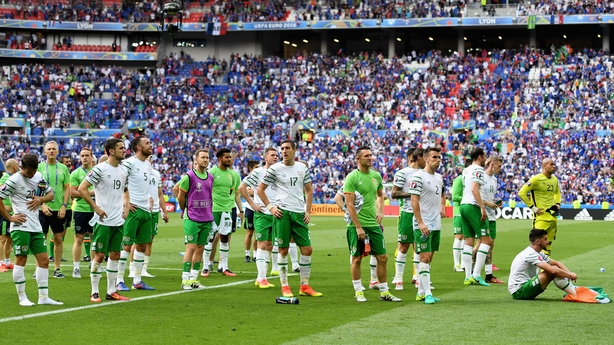
Build from tournamnet or post-Euro Hangover?
The summer tournament was still very fresh in the memory when Ireland’s World Cup campaign kicked off away in Belgrade.
The Boys in Green found themselves in a tough group containing Wales, Serbia and Austria, but Ireland manager O’Neill must have fancied his chances ahead of the opener, considering that all of Europe’s traditional big hitters were avoided in what was likely to set up a war of attrition between the aforementioned sides for the one automatic qualifying spot.
Naturally, Wales were coming into this group off the high of reaching the semi-finals in France, but Ireland had also made a good name for themselves and it was time to take that experience from France and go to take on Serbia with the confidence to announce their World Cup intentions.
Another early goal, arriving perhaps thanks to the hosts paying the Irish too much respect, before Serbia fought back to dominate the game until the latter stages when an inspired substitution saw Daryl Murphy power home a header to grab his first international goal. That point was well earned and may prove crucial further down the line.
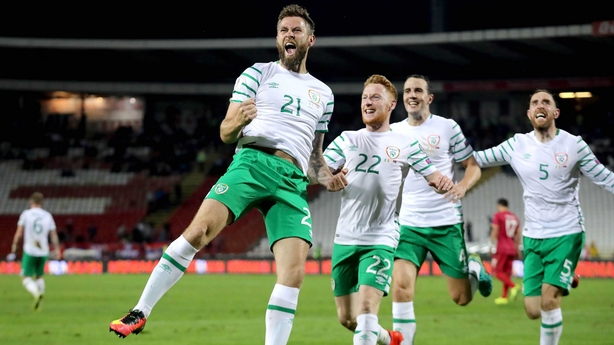
The Euros seemed a million miles away by the time Georgia came to Dublin for Ireland’s opening home game of the group.
O’Neill had been warning about the dangers of the side that Ireland had only beaten by a goal in both matches of the previous qualifying campaign, but his wary words must have had a profound effect on his side as they produced one of the worst opening 45 minutes of international football since the bad days of the previous regime.
A fortuitous winner, followed by a less than convincing victory away at Moldova, however, despite the performances, left Ireland in a commanding position in the group with seven points on the board.
Another tricky away test followed in Vienna in November, which gave Ireland a great chance to finish the year on a high, going into the long winter break.
Of course, an away point in Vienna would have been deemed a success but finally that Euro 2016 experience was starting to pay dividends as the match played out like it did for both sides in the summer.
The much-fancied Austrians failed to sparkle, going out in the group stages, while the never-say-die Irish arrived in the Austrian capital with nothing to lose and showing no fear.
With Ireland missing key players, the manager would have been forgiven for attempting to park the bus and play for a point, but an attacking side was named by O'Neill who was now showing real belief in his side.
The manager has a reputation for getting the best out of the players that he has at his disposal and James McClean is certainly a player benefiting from the O’Neill effect in this qualifying campaign, scoring three times in his last two matches.
That strike in Vienna, which handed Ireland a 1-0 away victory, showcasing the very best of what McClean can contribute to the Ireland cause.
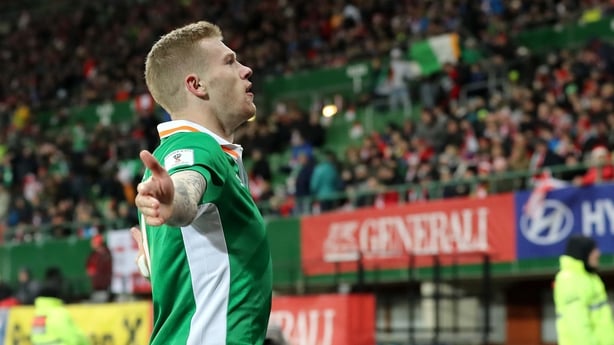
End of Year Report Card
So the last 12 months have really seen this Ireland team mature into quite the formidable unit, with several players really embracing the challenge of Euro 2016 and blossoming on the big stage.
The post-Euro hangover failed to manifest itself in Serbia, thanks to that late Murphy goal, and Ireland have put themselves in prime position to have a real go at World Cup qualification next year.
But the winter break in international football is a long, lingering one, and players might be returning to the Ireland set-up for the clash in March with a totally different mindset, should things take a downward turn at club level.
The post-Christmas spate of managerial casualties across the pond could also see clubs attempting to lure the Ireland management team away from international football.
Ten points from four games is an excellent return for the Irish, considering all their group rivals have dropped a lot more points in the process.
O’Neill’s Ireland already enjoy a six-point lead over Austria and are four points better off than Wales, who remarkably dropped two points to Georgia.
And of course, the Euro 2016 semi-finalists are next up as Ireland face Wales in Dublin next March.
But looking back at 2016, the stand-out moment of the year certainly arrived that Wednesday night in Lille when O’Neill’s side completed the Italian job.
That night could possibly go down as the match of the decade for the international side, however, if this World Cup campaign continues to reap rewards, this Ireland team have the potential to go one better in Russia in 2018.
If you want to relive all the highs and lows of the Republic of Ireland and Northern Ireland's adventures in Euro 2016, tune in to Euro 2016: Two Shades Of Green on RTÉ2, Thursday 29 December, 9.30pm

